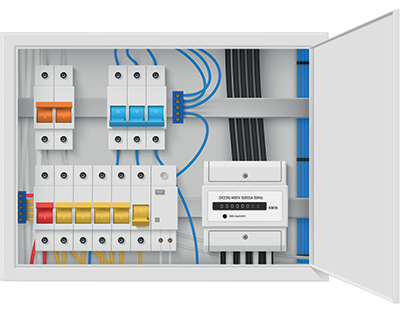Does a Home Survey Include Electrics?
A surveyor’s job is to give an overview of the property’s condition. With most homes in the UK lacking full electrical safety features, their role is to spot anything that has the potential to put the property at risk, as well as the need for repairs. What they don’t do is test every system in the home.
They’ll report visible issues like cracks in walls, damp, rotten timber, or early signs of subsidence. Roofs, windows, and doors are checked at a glance, along with details like the age of the building, its construction, and nearby risks such as trees close to the foundations.
This gives buyers a useful snapshot of the home’s overall state, although it doesn’t extend to areas like electrics, plumbing, or heating. When something looks outdated or unsafe, the surveyor will usually recommend a separate inspection.
Why should I worry about the electrics when buying a house in the UK?
Electrics are one of the most expensive parts of a property to put right if they turn out to be unsafe. The problem is that many of the main risks are hidden away from view, and a standard survey is only going to scratch the surface.
A home survey will not confirm:
- If the wiring meets current regulations
- How old the system is, or when it was last checked
- Whether the fuse box or consumer unit is up to date
- If residual current devices (RCDs) are in place
- The condition of circuits behind walls or under floors
- Whether past alterations were carried out by a qualified electrician
- If the property is likely to need a full rewire
- How much remedial work could cost
This can leave buyers facing a bill that can run into thousands. Commissioning a full Electrical Installation Condition Report (EICR) is the only way to know for certain whether a system is safe and fit for use.
When should I book a separate electrical survey?
A home survey is helpful for spotting visible issues, but it won’t tell you whether the electrics are safe. If the wiring looks old, or if there’s no sign the system has been updated in years, this will be flagged in your home survey; then it’s worth getting an independent check.
In this scenario, an EICR is typically carried out by a qualified electrician and gives you a clear view of the system’s condition. You should think about booking one if:
- The property is more than a few decades old
- The fuse box or consumer unit looks dated
- The house has been extended or altered over time
- There are signs of DIY electrics having been performed
- Sockets, switches, or fittings look damaged or poorly installed
- You can’t find any recent record of an electrical test
The cost of an EICR pales in comparison to the price of rewiring or dealing with faults further down the line. Having checks like these done before you commit can also help you avoid holdups if your lender raises concerns.
The perks of buying from a landlord
If you are buying from a landlord, the seller should have an up to date EICR, which they can provide to give you peace of mind.
In England, EICRs became mandatory for new tenancies from July 1, 2020, and for all existing tenancies from April 1, 2021, under the Electrical Safety Standards in the Private Rented Sector (England) Regulations 2020. Landlords must ensure a qualified person conducts an EICR at least every five years and provide a copy of the report to their tenants.
How do electrics affect the mortgage process?
Lenders are mainly interested in whether a property is worth the amount you’re borrowing. The upshot? Well, as long as the surveyor believes the home has sufficient value to cover the loan, the state of the electrics may not be mentioned anywhere in the valuation at all.
That doesn’t mean electrics aren’t important. If a surveyor suspects there are major safety concerns, they can recommend further checks, and a lender may hold back funds until those checks are complete. In some cases, they might reduce the loan amount or insist that repairs are carried out before releasing money.
For buyers, this shows clearly why it pays to go beyond the basic mortgage valuation. A separate electrical inspection makes sure you aren’t left with dangerous wiring, and it can also prevent delays with your mortgage application.
Do buyers get to see the electrical report?
Yes. An Electrical Installation Condition Report (EICR) is commissioned by the buyer, so the document belongs to you. The report explains the overall condition of the system and whether any urgent work is needed.
Why buyers always receive a copy:
- The inspection is ordered and paid for by you
- It’s part of your due diligence before exchange
- The findings may be used in negotiations with the seller
Because the report is yours, you can share it with your solicitor, lender, or contractor if remedial work is required.
Should you rely on a home survey alone?
No. A RICS home survey thoroughly inspects the broad picture of structural issues, damp, subsidence, roofs and more, but it only looks at electrics on the surface. For peace of mind, most buyers use the survey as their foundation, then follow up with other specialist inspections if needed.
- National coverage with local RICS surveyors.
- Rated Excellent on Trustpilot.
- We handle the booking.
- Same week availability.
What happens after the home survey?
If the RICS home survey highlights potential issues with electrics, the next step is to arrange a full EICR. This gives a clear view of whether the system is safe and what, if any, work is required. Acting on that report before exchange gives you the chance to renegotiate, ask for repairs, or walk away if it’s going to cost you too much.
What if the electrical report finds a problem?
An electrical report doesn’t always come back clean. Sometimes it highlights urgent faults that need immediate attention, while other times it simply notes that the system is old and should be upgraded in future.
If the report shows issues, you have a few choices:
- Ask the seller to carry out the work before contracts are exchanged
- Negotiate a reduction in the purchase price to cover the cost
- Accept the findings and budget for repairs once you move in
- Walk away if the electrics are unsafe and the cost is too high
None of these outcomes mean the purchase has to fail, but they should change how you approach it. The key is to have the facts in front of you early, so you can make an informed decision, rather than being caught out later.
How can you avoid unexpected electrical costs?
While you can’t see everything during a viewing, there are steps that reduce the risk of surprise bills later. Paying attention early on makes it easier to decide whether an EICR is worth arranging before you commit.
Things buyers can do include:
- Check the fuse box — a modern consumer unit with trip switches is a good sign
- Look at the age of sockets and switches — yellowed or cracked fittings suggest old wiring
- Ask the seller when the system was last inspected by an electrician
- Be cautious with homes that have been heavily altered without paperwork
- Factor the cost of an EICR into your budget if the property hasn’t been checked recently
- Take your home surveyor's advice if they recommend an EICR
Taking these steps won’t replace a professional inspection, but they can give you early clues about whether the electrics in the house you’re about to buy might be a problem.
Caragh is an excellent writer and copy editor of books, news articles and editorials. She has written extensively for SAM for a variety of conveyancing, survey, property law and mortgage-related articles.
Andrew started his career in 2000 working within conveyancing solicitor firms and grew hands-on knowledge of a wide variety of conveyancing challenges and solutions. After helping in excess of 50,000 clients in his career, he uses all this experience within his article writing for SAM, mainstream media and his self published book How to Buy a House Without Killing Anyone.










